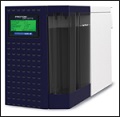|
Presented by LCGC and Spectroscopy |
Featured Articles
Among all the analytical techniques available for epitope mapping studies, hydrogen–deuterium exchange mass spectrometry (HDX-MS) is usually the fastest and easiest to carry out. We present here the epitope mapping of three distinct monoclonal antibody (mAb) candidates targeting the same antigen, an interleukin receptor. The goal is to establish the binding mode of these mAbs, and explain possible differences observed for in vitro binding and in vivo function.
read more
Advertisement
Shimadzu's LCMS-9030 Q-TOF mass spectrometer combines the engineering DNA from our proven LC-MS/MS platform with powerful new TOF architecture to transform high mass accuracy workflows. Data acquisition and analysis control software provides researchers with easy, yet flexible workflows. The result is a system that delivers high-resolution, accurate-mass detection with incredibly fast data acquisition rates, allowing you to perform critical analysis with confidence.  Learn more Learn more
The past decade has witnessed resurgent interest in coupling GC to atmospheric-pressure chemical ionization (APCI), which is suitable for the high column flows required for using flow modulation. This study assesses the use of GP-APCI with flow modulation for sensitive detection of selected trace organics. read more
|
|
|
|
The structural complexity of monoclonal antibodies (mAbs) challenges the capabilities of even the most advanced chromatography and mass spectrometry techniques. This study examines the use of micro-pillar array columns in combination with mass
spectrometry for peptide mapping of both mAbs and antibody–drug conjugates (ADCs).
read more
|
|
|
Application Note
 |
Note discusses the benefits of switching from Helium to Hydrogen for carrier gas in gas chromatography.
 Read more Read more |
|
|
|
|
NEW WEBCASTS
North America: Wednesday, October 31, 2018 at 11 am EDT | 10 am CDT | 8 am PDT
Europe: Thursday, 1 November, 2018 at 0900 GMT | 1000 CET
Asia Pacific: Friday, 2 November, 2018 at 0830 am IST | 1100 CST | 1200 JST
Thursday, Nov. 1, 2018 at 11 am EDT | 8 am PDT | 3 pm GMT | 4 pm CET
Monday, Nov. 5, 2018 at 9 am EST | 2 pm GMT | 3 pm CET
|
|
|
Tuesday, Nov. 6, 2018 at 11 am EST | 8 am PST | 4 pm GMT | 5 pm CET
Wednesday, Nov. 7, 2018 at 11 am EST | 8 am PST | 4 pm GMT | 5pm CET
Friday, Nov. 9, 2018 at 11 am EST | 8 am PST | 4 pm GMT | 5 pm CEST
|
|
|
|
|